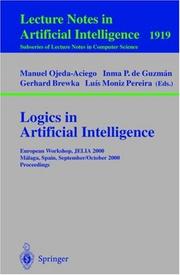
Logics in artificial intelligence
By Gerhard Brewka, Manuel Ojeda-Aciego
Subjects: Symbolic and mathematical Logic, Congresses, Logic, Symbolic and mathematical, Logic, symbolic and mathematical, Artificial intelligence
Description: Logics in Artificial Intelligence: European Workshop, JELIA 2000 Málaga, Spain, September 29 – October 2, 2000 Proceedings<br />Author: Manuel Ojeda-Aciego, Inma P. de Guzmán, Gerhard Brewka, Luís Moniz Pereira<br /> Published by Springer Berlin Heidelberg<br /> ISBN: 978-3-540-41131-4<br /> DOI: 10.1007/3-540-40006-0<br /><br />Table of Contents:<p></p><ul><li>‘On Being Informed’: Update Logics for Knowledge States </li><li>Considerations on Updates of Logic Programs </li><li>The </li><li>Semi-qualitative Reasoning about Distances: A Preliminary Report </li><li>Hybrid Probabilistic Logic Programs as Residuated Logic Programs </li><li>Topo-distance: Measuring the Difference between Spatial Patterns </li><li>An Abductive Mechanism for Natural Language Processing Based on Lambek Calculus </li><li>Capturing Stationary and Regular Extensions with Reiter’s Extensions </li><li>Representing the Process Semantics in the Event Calculus </li><li>Declarative Formalization of Strategies for Action Selection: Applications to Planning </li><li>An Algorithmic Approach to Recover Inconsistent Knowledge-Bases </li><li>Acceptance Without Minimality </li><li>Reduction Theorems for Boolean Formulas Using Δ-Trees </li><li>Simultaneous Rigid Sorted Unification </li><li>Partially Adaptive Code Trees </li><li>On Dialogue Systems with Speech Acts, Arguments, and Counterarguments </li><li>Credulous and Sceptical Argument Games for Preferred Semantics </li><li>A General Approach to Multi-agent Minimal Knowledge </li><li>A Modal Logic for Network Topologies </li><li>Avoiding Logical Omniscience by Using Subjective Situations</li></ul>
Comments
You must log in to leave comments.